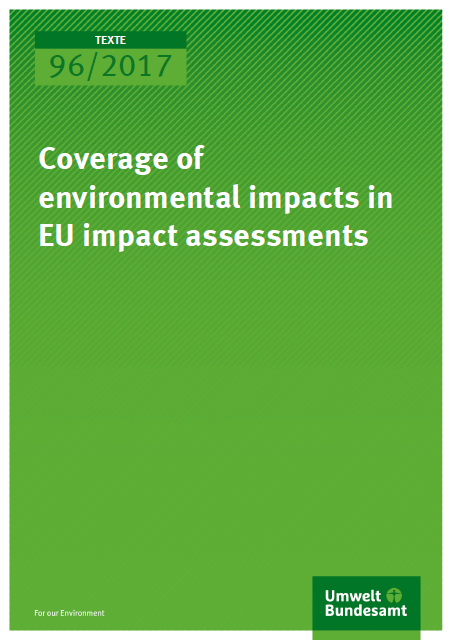Impact Assessment is an essential process in the world of policy-making. At the EU level, it is a requirement for every new policy project. UBA led a study to analyze the consideration for environmental impacts in these studies and whether there were lessons to learn for Germany. Ecologic Institute collaborated with Zurich-based INFRAS to scrutinize a sample of IAs published by the European Commission and analyze emerging trends. UBA and the consulting team then organized a workshop in Brussels to discuss their findings with representants of European Institutions (DG Environment, European Policy Research Service, Joint Research Center, etc.) and international IA experts. The presentation slides by Ecologic Institute and INFRAS are available for download.
Ecologic Institute and INFRAS started the workshop by presenting the results of their study. The team found that the description of environmental effects in IAs was mostly adequate, although they were rarely monetized. There was a clear predominance of economic impacts in the decision making process. In regard to the considered policy options in the IAs, they were broader than before but an institutional bias persisted. The team concluded that transparency of the prioritization process is crucial for the credibility of IA, which has now established itself as part of the policy making process. After lunch, Claudio Collova presented a relevant study conducted by the European Parliamentary Research Service, "The first 100 initial appraisals of European Commission Impact Assessments (2012-2015)".
The discussions that followed both presentations covered many similar themes. It was generally accepted that some types of environmental impacts were better covered than others. Participants also agreed that considering the proportionality rule was also a challenge when conducting an IA as proportionality of analysis could lead to a constant neglect of some environmental impacts. Most participants found that data availability was one of the main limiting factors in the quality of IAs, highlighting the need for long term investment in models and data.
Despite all these challenges, it was agreed that the IA process has come a long way. The over-whelming consensus among participants was that the quality of IAs has improved over time. The requirement to build an inter-service group (ISG) early in the policy making process was perceived as beneficial. Similarly, the growing importance that is placed on ex post evaluation should further improve the quality of IAs by increasing the evidence base. Public consultation helps determine better options, though it is resource intensive and can sometimes lead to bias. Some participants noted that problem definition should also be scrutinized, as it has great influence on the options selected in IAs.





